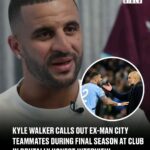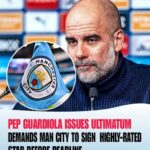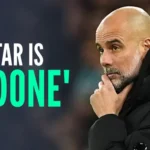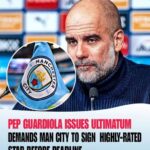Andres Iniesta has already told Man City why they would be stupid to sell £50m player
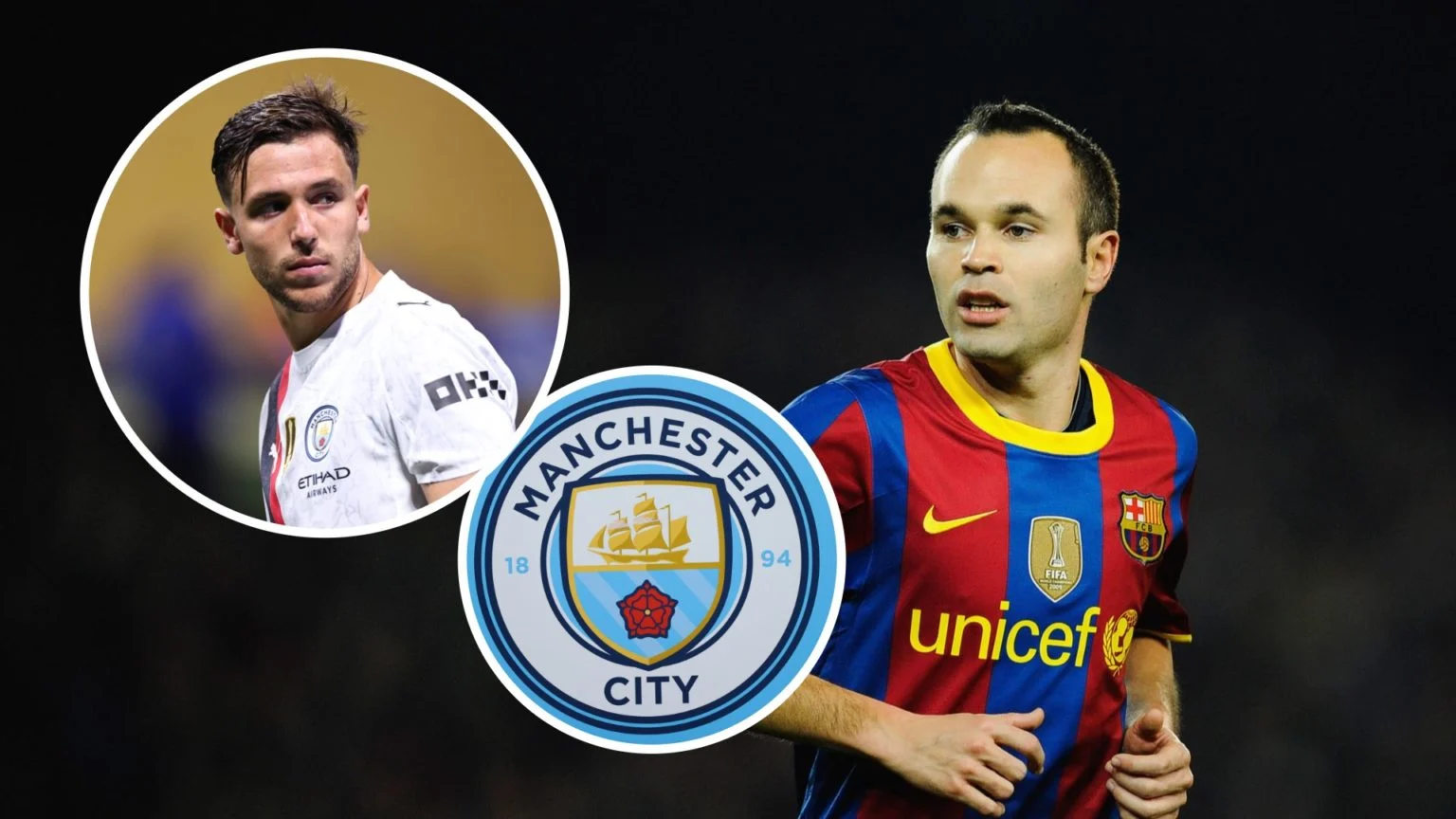
Manchester City finds itself at a crossroads this summer, with several key decisions looming that could shape the club’s future trajectory. Among the most pressing concerns is the potential departure of Nico Gonzalez, the Spanish midfielder who arrived at the Etihad Stadium just five months ago in a £50 million move from Porto. The situation has sparked intense debate among fans and pundits alike, with club legend Andres Iniesta’s prophetic words from 2022 now taking on new significance.
The current transfer window has already seen significant movement at Manchester City, with Kyle Walker’s surprising move to Burnley marking the end of an era. As Pep Guardiola and sporting director Hugo Viana assess their squad for the upcoming campaign, the decision regarding Gonzalez’s future could prove to be one of the most consequential of the summer.
The Nico Gonzalez Saga: From Promise to Uncertainty
The Initial Investment
When Manchester City secured Nico Gonzalez’s signature in February 2025, it represented a significant statement of intent from the club. The £50 million fee paid to Porto demonstrated the club’s belief in the 23-year-old’s potential, with many viewing him as a long-term successor to aging midfield stalwarts. The Spain Under-21 international arrived with a reputation as one of Europe’s most promising young talents, having impressed consistently in the Portuguese league.
Gonzalez’s profile fitted perfectly with Manchester City’s recruitment strategy: young, technically gifted, and possessing the versatility to operate in multiple midfield roles. His ability to dictate tempo, combined with his defensive work rate and passing range, made him an attractive proposition for Guardiola’s system. The investment was seen as forward-thinking, addressing the club’s need for midfield depth while securing a player who could develop into a key figure for years to come.
Early Struggles and Limited Opportunities
Despite the substantial investment, Gonzalez’s integration into Manchester City’s first team has been slower than many anticipated. The Spanish midfielder managed just nine Premier League starts following his February arrival, a relatively modest return given his price tag and the expectations surrounding his signing. While these appearances provided glimpses of his quality, they also highlighted the challenges facing any new player attempting to break into Guardiola’s established system.
The situation has become more complex following recent developments within the squad. The return of Rodri from injury, combined with the signing of Tijjani Reijnders, has further limited Gonzalez’s opportunities. During the FIFA Club World Cup, a tournament that might have provided an ideal platform for the young Spaniard to showcase his abilities, Guardiola handed him just 61 minutes of action across all matches. This limited playing time has understandably led to frustration for both the player and his representatives.
The Growing Discontent
According to reports from Manchester City News, Gonzalez is now ready to leave the club if a suitable opportunity arises elsewhere. This development represents a significant shift from the optimism that surrounded his arrival just months earlier. The player’s willingness to consider a departure so soon after his expensive move speaks to the challenges he has faced in adapting to life at the Etihad Stadium.
The club’s apparent openness to sanctioning a sale has raised eyebrows throughout the football world. For a team that invested £50 million in a player less than six months ago to be considering his departure suggests either a fundamental misjudgment in recruitment or a lack of patience that could prove costly in the long term. This situation has prompted many to question whether Manchester City is repeating the mistakes that have seen talented young players leave the club prematurely in recent years.
Andres Iniesta’s Prophetic Warning
The Legend’s Insight
The most compelling argument against selling Gonzalez comes from an unlikely source: Andres Iniesta, the Barcelona legend who worked under Guardiola during some of the most successful years in the Catalan club’s history. In 2022, while discussing young Spanish talents on a Twitch stream, Iniesta specifically mentioned Gonzalez alongside Barcelona’s Gavi, offering insights that now seem remarkably prescient.
Iniesta’s comments were particularly notable given his intimate knowledge of Guardiola’s methods and expectations. Having made 181 appearances under the Manchester City manager during their time together at Barcelona, Iniesta understood better than most what it takes to succeed in a Guardiola system. His assessment of Gonzalez was unequivocal: the young midfielder possessed “brutal talent and physical conditions” that, with proper nurturing, could develop into something special.
The Importance of Patience
The crucial element of Iniesta’s analysis centered on the need for patience and the right environment for young players to develop. “Don’t forget their ages,” Iniesta emphasized. “They must continue to grow in a good environment and develop their talent.” These words carry particular weight when applied to Gonzalez’s current situation at Manchester City.
At just 23 years of age, Gonzalez is still in the developmental phase of his career. The expectation that he should immediately establish himself in one of the world’s most competitive squads may be unrealistic, particularly given the adjustment period required for any player moving to a new league and tactical system. Iniesta’s emphasis on creating the right environment for growth suggests that Manchester City’s potential decision to sell could be premature and counterproductive.
Learning from Barcelona’s Success
Iniesta’s perspective is informed by his experience at Barcelona, where Guardiola successfully integrated numerous young talents into a world-class team. The patience shown to players like Sergio Busquets, who required time to adapt to the highest level, ultimately paid dividends as they became integral to the team’s success. The parallel with Gonzalez’s situation is clear: rushing to judgment on a young player’s potential could result in missing out on significant future contributions.
Manchester City’s Historical Transfer Mistakes
The Pattern of Premature Departures
Manchester City’s recent history is littered with examples of talented young players who were allowed to leave the club before reaching their potential. The cases of Morgan Rogers, Cole Palmer, and Romeo Lavia serve as stark reminders of the dangers of lacking patience with developing talent. All three players have gone on to become key figures in the Premier League after leaving the Etihad Stadium, raising questions about the club’s ability to nurture young talent.
Cole Palmer’s transformation at Chelsea has been particularly galling for Manchester City supporters. The academy graduate, who made just 32 appearances for his boyhood club, has become one of the Premier League’s most exciting young players since his move to Stamford Bridge. His creativity, goal-scoring ability, and leadership qualities were evident during his time at City, yet the club chose to cash in rather than invest in his development.
The Financial Implications
The departure of these players has had significant financial implications for Manchester City. Palmer alone is now valued at considerably more than the £42.5 million Chelsea paid for his services, while Rogers and Lavia have also seen their market values increase substantially since leaving. The pattern suggests a systematic failure to recognize and nurture talent, resulting in both sporting and financial losses.
The potential sale of Gonzalez would represent a continuation of this troubling trend. Having invested £50 million in the player just months ago, accepting a lower fee now would represent a significant financial loss. More importantly, it could result in Manchester City losing a player who goes on to fulfill his considerable potential elsewhere, adding another name to the growing list of “ones that got away.”
Learning from Past Mistakes
Hugo Viana’s appointment as sporting director presents an opportunity for Manchester City to learn from these past mistakes. The Portuguese executive has built a reputation for identifying and developing young talent during his time at Sporting CP, making him ideally positioned to assess Gonzalez’s long-term potential. His decision regarding the Spanish midfielder’s future could set the tone for how the club approaches youth development in the years to come.
The Current Squad Dynamics
Midfield Competition
The competition for places in Manchester City’s midfield has intensified following recent additions to the squad. Rodri’s return from injury has restored stability to the defensive midfield position, while the signing of Tijjani Reijnders has added another option in the central areas. This increased competition has inevitably limited opportunities for Gonzalez, but it also provides an environment where he can learn from established stars.
The presence of players like Kevin De Bruyne, Rodri, and Reijnders should be viewed as an opportunity rather than an obstacle for Gonzalez’s development. Training alongside such talented individuals daily provides invaluable experience and learning opportunities that could accelerate his growth as a player. The key is ensuring that he receives sufficient playing time to apply these lessons in match situations.
Tactical Flexibility
Guardiola’s tactical system demands versatility from his midfield players, with the ability to operate in multiple positions often determining a player’s success. Gonzalez’s technical ability and understanding of the game suggest he possesses the attributes necessary to thrive in this environment, but adaptation takes time. The complexity of Guardiola’s system means that even experienced players often require a full season to fully understand their roles and responsibilities.
The manager’s track record of developing midfield players should provide encouragement regarding Gonzalez’s prospects. From Sergio Busquets at Barcelona to Rodri at Manchester City, Guardiola has consistently improved players in this position through careful coaching and tactical instruction. Gonzalez’s youth and technical ability make him an ideal candidate for this type of development.
The Kyle Walker Departure: A Changing of the Guard
End of an Era
Kyle Walker’s departure to Burnley marked the end of a significant chapter in Manchester City’s recent history. The 35-year-old defender’s eight-year stint at the Etihad Stadium saw him become one of the club’s most consistent performers, contributing to numerous trophy successes under Guardiola. His departure creates both opportunities and challenges for the squad as they prepare for the upcoming season.
Walker’s comments about his former teammates following his move to Burnley provided insight into the respect he commands within the squad. His description of Erling Haaland as “clinical” and Kevin De Bruyne as “brilliant” reflects the high standards that exist within the Manchester City dressing room. These standards should serve as motivation for players like Gonzalez as they seek to establish themselves in the team.
Creating Opportunities
The veteran’s departure, along with other squad changes, creates opportunities for younger players to step up and claim regular places in the team. For Gonzalez, this changing of the guard represents a chance to establish himself as a key figure in Manchester City’s future plans. The club’s willingness to move on from established players suggests that positions are available for those who can demonstrate they deserve them.
The transition period also provides Guardiola with an opportunity to experiment with different tactical approaches and player combinations. Gonzalez’s versatility and technical ability make him well-suited to feature in these experiments, potentially discovering new roles and responsibilities that could unlock his potential.
The Broader Context: Manchester City’s Transfer Strategy
Balancing Act
Manchester City’s transfer strategy has always involved a delicate balancing act between investing in established stars and developing young talent. The club’s success in recent years has been built on a foundation of experienced players supplemented by carefully selected additions. However, the increasing focus on Financial Fair Play regulations and the need for sustainable growth has placed greater emphasis on developing homegrown talent.
The decision regarding Gonzalez’s future reflects this broader strategic consideration. Selling the player now would provide short-term financial relief but could undermine the club’s long-term development plans. Conversely, showing patience and investing in his development could yield significant returns both on and off the pitch.
The Hugo Viana Factor
Hugo Viana’s appointment as sporting director brings a different perspective to Manchester City’s recruitment strategy. His success at Sporting CP was built on identifying and developing young talent, creating a sustainable model that balanced financial constraints with sporting ambitions. His approach to Gonzalez’s situation could signal a shift in how the club approaches player development.
Viana’s experience suggests he understands the importance of patience when dealing with young players. His track record of developing talents like Pedro Gonçalves and Matheus Nunes demonstrates his ability to create environments where players can flourish. Applying this philosophy to Gonzalez’s situation could prove crucial in determining the player’s future at the club.
Looking Forward: The Path to Success
Creating the Right Environment
For Gonzalez to succeed at Manchester City, the club must create an environment that allows him to develop naturally without excessive pressure. This means providing regular playing time, even if it comes in less high-profile matches initially, and maintaining faith in his abilities during inevitable periods of inconsistency.
The integration process should be gradual, allowing the player to build confidence and understanding of the system progressively. This approach requires patience from all stakeholders, including fans, media, and club management. The investment in Gonzalez’s development should be viewed as a long-term project rather than expecting immediate returns.
The Potential Rewards
If Manchester City can successfully develop Gonzalez into a key player, the rewards could be substantial. His youth means he could provide the foundation for the midfield for the next decade, offering both sporting and financial benefits. The club’s investment in his development could yield returns far exceeding the initial transfer fee if he reaches his potential.
The Spanish midfielder’s international experience and technical ability suggest he possesses the tools necessary to succeed at the highest level. With proper guidance and patience, he could become one of the Premier League’s standout midfield players, justifying both the initial investment and the faith shown in his development.
Conclusion: A Defining Moment
The decision regarding Nico Gonzalez’s future represents a defining moment for Manchester City’s approach to player development. Andres Iniesta’s prescient words serve as a reminder that talent development requires patience, environment, and belief. The club’s handling of this situation will send a message about their commitment to nurturing young talent and could influence how future prospects view their chances of success at the Etihad Stadium.
The examples of Palmer, Rogers, and Lavia serve as cautionary tales about the dangers of premature departures. Manchester City cannot afford to add another name to this list, particularly one that cost £50 million to acquire. The club’s success in recent years has been built on making smart long-term decisions, and showing patience with Gonzalez would represent a continuation of this philosophy.
Hugo Viana’s expertise in developing young talent provides hope that Manchester City can learn from past mistakes. His approach to Gonzalez’s situation could set the tone for how the club handles similar situations in the future. The Spanish midfielder’s development could serve as a template for integrating young players into the first team while maintaining the high standards expected at the club.
Ultimately, the decision rests with Guardiola and the club’s hierarchy. However, the wisdom of Iniesta’s words and the lessons learned from past departures suggest that patience and investment in Gonzalez’s development represent the most prudent path forward. The potential rewards of this approach far outweigh the risks, making the retention and development of the young Spaniard a crucial priority for Manchester City’s future success.
The coming weeks will reveal whether Manchester City has learned from its past mistakes or is destined to repeat them. For the sake of the club’s future and Gonzalez’s career, one can only hope that wisdom and patience prevail over short-term considerations. The £50 million investment deserves more than five months to prove its worth, and the club’s commitment to developing young talent hangs in the balance.
